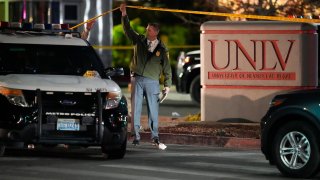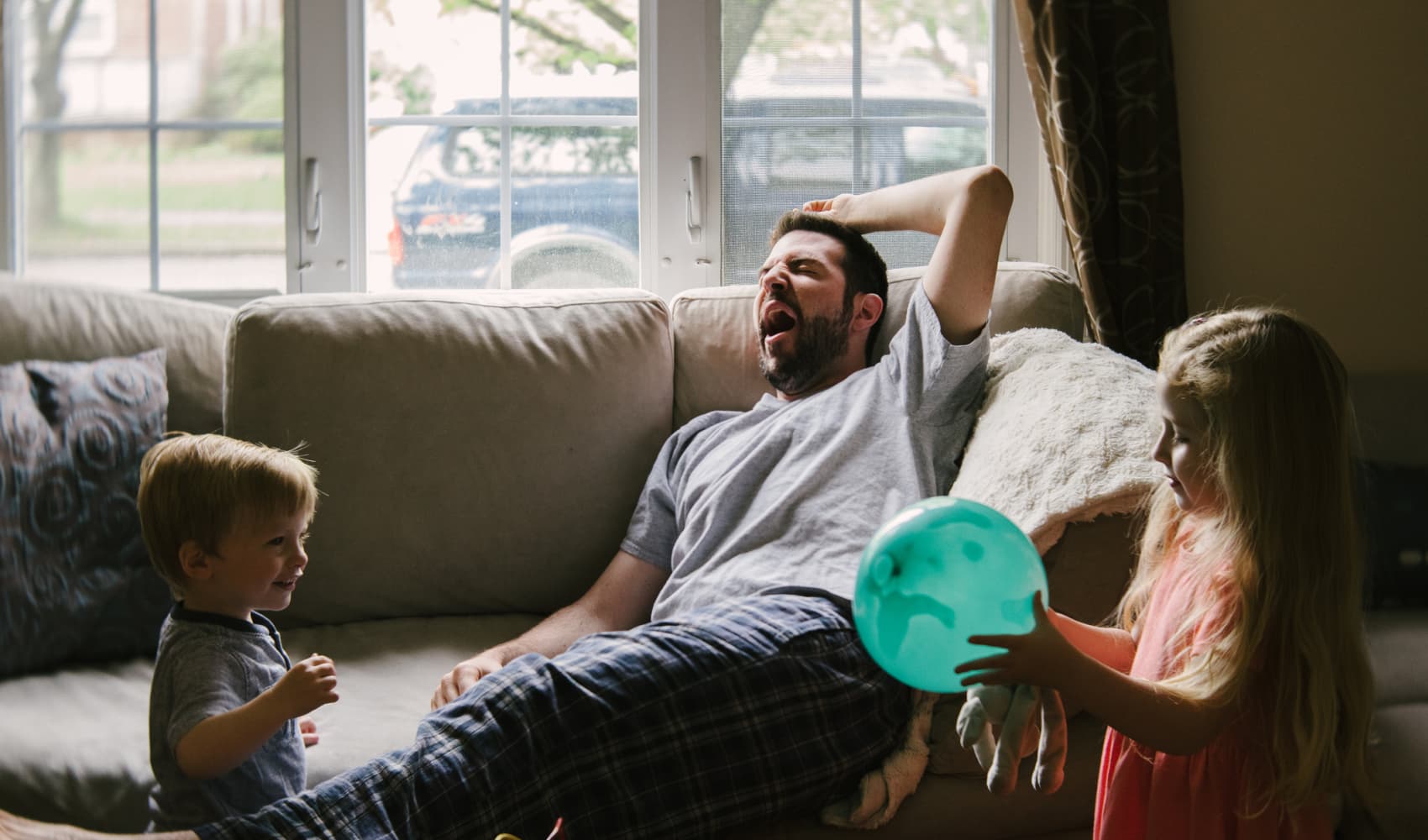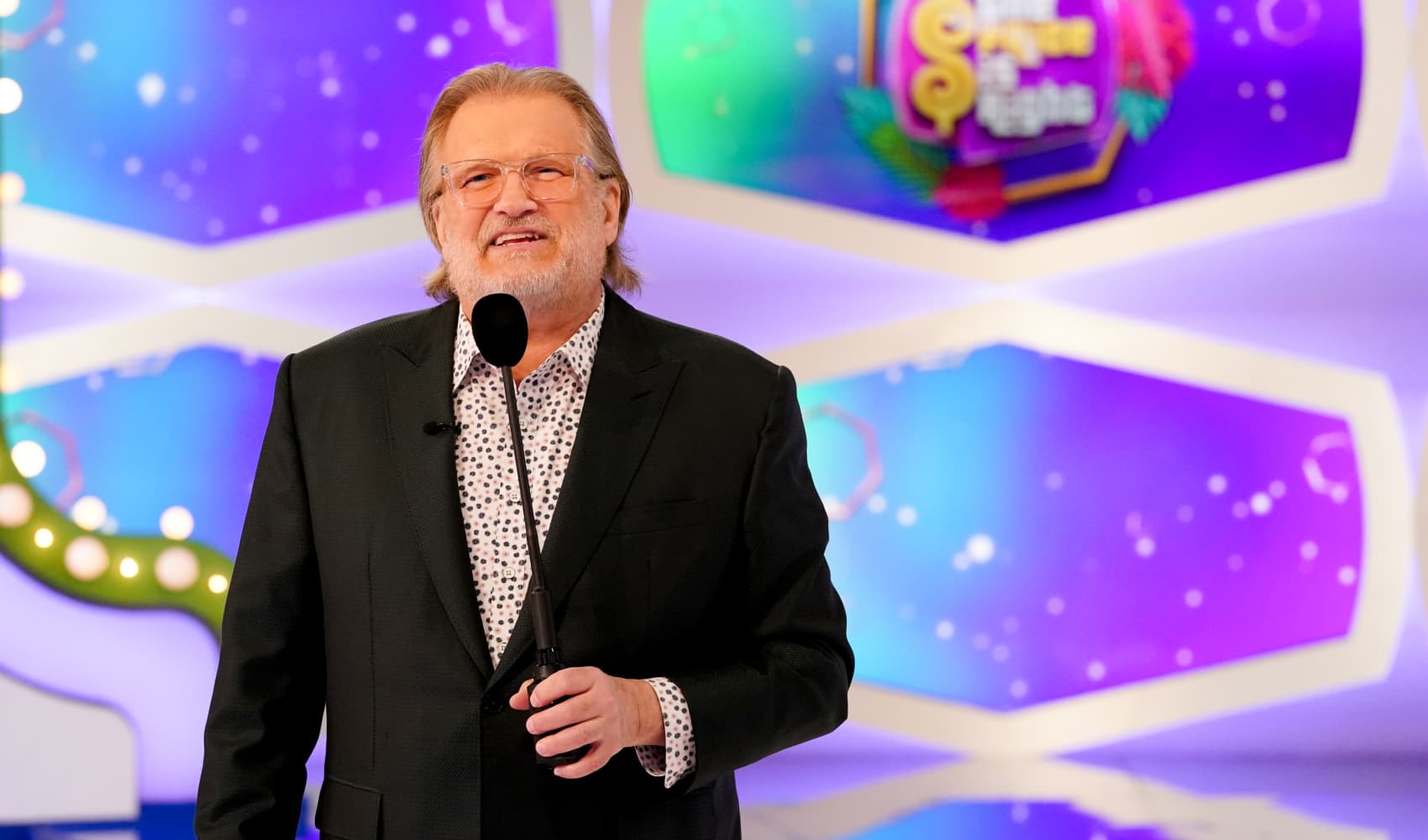
Fire alarms blared in the background of 911 calls that police released Friday, amplifying the terrified voices of students and faculty at the University of Nevada, Las Vegas as they hid inside locked offices and under desks while a gunman fired shots outside, killing three professors.
“Someone’s shooting. Please hurry,” said one woman caller, her voice cracking with fear as she described the shots as sounding like they were next door. “I really want to go home.”
The gunman, 67-year-old Anthony Polito, walked into UNLV’s business school around lunchtime Wednesday and fired shots as he roamed the top three floors, where faculty offices are located, police said. Along with the three people who were killed, a 38-year-old visiting professor was wounded and hospitalized with life-threatening injuries.
After police killed Polito in a shootout, he was found to be carrying nine magazines for a 9 mm handgun he’d legally purchased last year and a list of targets at the school — although none of those shot was on that list, police said.
University President Keith Whitfield said Friday that after this week's shooting, students and students and faculty will not return to campus this year and final exams next week have been canceled.
“Given the physical and emotional trauma that the university community has endured, and because of the impact to campus facilities, we have decided that faculty and staff should continue to work remotely through the end of the calendar year,” Whitfield said in a letter to students and staff.
The attack at UNLV terrified a city that experienced the deadliest shooting in modern U.S. history in October 2017, when a gunman killed 60 people and wounded more than 400 after opening fire from the window of a high-rise suite at Mandalay Bay on the Las Vegas Strip, just miles from the UNLV campus.
U.S. & World
Among the first to call 911 was a graduate student, who told an operator he was locked in his office on the fourth floor and had seen an unfamiliar man walk by before the shooting started.
“A lot of shots and then screaming,” he said, describing what he was hearing. He estimated about six shots.
Feeling out of the loop? We'll catch you up on the Chicago news you need to know. Sign up for the weekly Chicago Catch-Up newsletter here.
White House press secretary Karine Jean-Pierre said President Joe Biden, who was visiting Las Vegas on Friday, was scheduled to meet with with Whitfield and other local leaders "to personally share his condolences for those they have lost and reaffirm our support for local law enforcement, UNLV, and the broader community in the wake of this tragedy.”
Police still had no motive for Wednesday's attack but said the shooter, who was a career college professor, had been denied a job at various Nevada colleges and universities before the shooting and appeared to be struggling financially.
The shooter arrived at UNLV about 15 minutes before the shooting in a 2007 Lexus that he parked in a lot south of the business school, Clark County Sheriff Kevin McMahill said.
The gunman got out of the car, placed loaded magazines in his waistband and then entered the business school at 11:33 a.m. The first reports of gunfire came at 11:45 a.m., McMahill said.
University and city police swarmed the building. UNLV police Chief Adam Garcia has said the first university officer arrived at the business school within 78 seconds of the gunfire report.
Near the main entrance, UNLV officers saw Polito leaving the building, and a shootout erupted. Police killed him about 10 minutes after his rampage began.
Two of the victims were business school professors Patricia Navarro-Velez and Cha Jan “Jerry” Chang. The third victim, Naoko Takemaru, was an associate professor of Japanese studies whose office was on the third floor of the business building.
Navarro-Velez, 39, was an accounting professor who held a Ph.D. and was currently focused on research in cybersecurity disclosures and data analytics, according to the school’s website.
Chang, 64, was an associate professor in the business school’s Management, Entrepreneurship & Technology department and had been teaching at UNLV since 2001. He earned a Ph.D. in management information systems from the University of Pittsburgh.
Takemaru, 69, oversaw the university’s Japanese studies program and taught upper-division courses on Japanese language, culture and business.
It’s unclear how many shots the gunman fired, but the sheriff said he brought more than 150 rounds of ammunition to the campus.
Given that sheer number of rounds, McMahill said he believed the suspect may have been intending to open fire on the student union next to the business school, where students were hanging out, eating and playing games.
The gunman also was carrying what McMahill described as a “target list” of named faculty members both from UNLV and from East Carolina University in North Carolina, where he taught at the business school from 2001 to 2017.
He resigned from East Carolina as a tenured associate professor, according to a statement Thursday from the university.
Polito's employment record at East Carolina did not include any disciplinary actions or red flags, according to a law enforcement official with direct knowledge of the investigation. The official was not authorized to release the information publicly and spoke to The Associated Press on the condition of anonymity.
The gunman had been living in the Las Vegas area since at least 2018.
Roseman University of Health Sciences in Henderson said the shooter had an adjunct faculty contract and taught two courses in the school’s the Master of Business Administration program from October 2018 to June 2022. He left when the program was discontinued, said Jason Roth, a spokesperson for the school.
One of the suspect's former students at East Carolina, Paul Whittington, said his former professor often talked about his regular trips to Las Vegas. He also seemed obsessive about anonymous student reviews at the end of each semester, Whittington said.
“He always talked about the negative feedback he got,” said Whittington, now 33, who took Polito’s intro to operations management class in 2014. “He didn’t get a lot of it, but there would always be one student every semester, or at least one student every class, that would give a negative review. And he fixated on those.”
___
Finley reported from Norfolk, Virginia. Associated Press reporters Michael Balsamo in Washington, Ken Ritter in Las Vegas, Susan Montoya Bryan in Albuquerque, Terry Tang and Anita Snow in Phoenix and Robert Jablon in Los Angeles contributed to this report.



